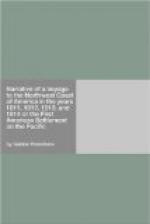Some natives visited us this day, bringing with them beaver-skins; but the inquietude caused in our minds by the loss of two boats’ crews, for whom we wished to make search, did not permit us to think of traffic. We tried to make the savages comprehend, by signs, that we had sent a boat ashore three days previous, and that we had no news of her; but they seemed not to understand us. The captain, accompanied by some of our gentlemen, landed, and they set themselves to search for our missing people, in the woods, and along the shore N.W. of the cape. After a few hours we saw the captain return with Weeks, one of the crew of the last boat sent out. He was stark naked, and after being clothed, and receiving some nourishment, gave us an account of his almost miraculous escape from the waves on the preceding night, in nearly the following terms:—
“After you had passed our boat;” said he, “the breakers caused by the meeting of the wind roll and ebb-tide, became a great deal heavier than when we entered the river with the flood. The boat, for want of a rudder, became very hard to manage, and we let her drift at the mercy of the tide, till, after having escaped several surges, one struck us midship and capsized us. I lost sight of Mr. Aiken and John Coles: but the two islanders were close by me; I saw them stripping off their clothes, and I followed their example; and seeing the pinnace within my reach, keel upward, I seized it; the two natives came to my assistance; we righted her, and by sudden jerks threw out so much of the water that she would hold a man: one of the natives jumped in, and, bailing with his two hands, succeeded in a short time in emptying her. The other native found the oars, and about dark we were all three embarked. The tide having now carried us outside the breakers, I endeavored to persuade my companions in misfortune to row, but they were so benumbed with cold that they absolutely refused. I well knew that without clothing, and exposed to the rigor of the air, I must keep in constant exercise. Seeing besides that the night was advancing, and having no resource but the little strength left me, I set to work sculling, and pushed off the bar, but so as not to be carried out too far to sea. About midnight, one of my companions died: the other threw himself upon the body of his comrade, and I could not persuade him




